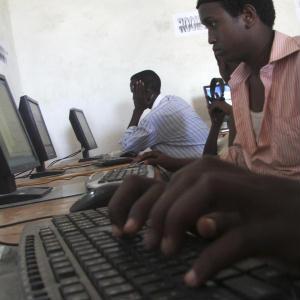
This is the VOA Special English Technology Report.
A new Internet training center in Togo will give young people in that part of West Africa a chance to improve their job skills.
The International Telecommunication Union and the computer-networking company Cisco Systems launched the center. A telecom company in Lome is also taking part in the effort.
Robert Shaw of the ITU says students will learn the basics of what he calls the "real plumbing of the Internet."
ROBERT SHAW: "Internet protocol-based networks, they're almost behind everything we do. They run the financial systems. They might be controlling the power systems. So either directly or indirectly we're dependent upon these systems. And there's a lot of pressure to have trained people."
This month, five instructors completed two weeks of intensive training known as the Cisco Certified Networking Academy. They also learned how to train others. Robert Shaw says this kind of train-the-trainer program helps meet a growing demand for professionals in information and communication technologies, or ICT.
ROBERT SHAW: "The Internet and these networks are growing so fast, it's really hard to keep up. It's a bit like what they said in 'Alice in Wonderland': you have to run twice as fast just to stay in the same place. And the rate of change means it's very difficult for the classical educational programs to keep up with the demand that's out there in the marketplace."
Mr. Shaw says recent years have seen an even stronger demand for these kinds of programs in the developing world.
ROBERT SHAW: "Now, of course, at the end of 2010 there's about two billion users on the internet. The majority of those -- about 1.2 billion -- is now in developing countries, and that's almost the complete opposite of what the situation was five years ago."
The ITU launched its Internet Training Center program in 2001. The centers are meant to help spread the growth of ICT jobs to developing countries. More than 80 centers have opened in the Asia-Pacific area, Latin America, Eastern Europe and Africa.
Mr. Shaw says the new center in Lome will open to students in March.
ROBERT SHAW: "One of the things we're trying to do in this program is also to encourage participation by women, by girls. So there's a recommendation that they target at least 30 percent female enrollment."
Other locations in Africa include Angola, Cape Verde, Kenya, Malawi and Mali. They also include Rwanda, Senegal, Tanzania, Mauritania, Uganda and Zimbabwe.
Students pay for the training; the cost is different in each country. Those who complete the program are known as Cisco-certified. The program lasts about six months because most students attend part time.
And that's the VOA Special English Technology Report, written by June Simms. You can read and listen to all of our reports at voaspecialenglish.com. You can also join us on Facebook, Twitter and YouTube at VOA Learning English. I'm Steve Ember.
2 billion people expected online by end of 2010
Technology brings jobs to the disabled
(來源:VOA 編輯:崔旭燕)
